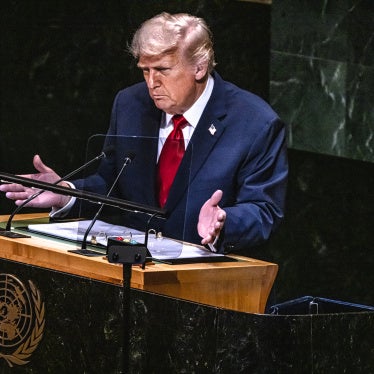If a resolution authorizing war against Iraq is passed by the United Nations Security Council, it must include clear and concrete protections for civilians, Human Rights Watch said today.
The United States and United Kingdom are slated to introduce a new resolution today authorizing military action to force Iraq's compliance with Resolution 1441. In an open letter to Security Council members, Human Rights Watch highlighted serious dangers civilians would face in any conflict.
Human Rights Watch takes no position on whether war against Iraq is justified or legal. However, if war occurs, Human Rights Watch stressed that the Security Council should anticipate and try to minimize the risks to civilians.
"If there's war in Iraq, civilians will bear the brunt of the suffering," said Kenneth Roth, executive director of Human Rights Watch. "Intense pressure from the Security Council may be the only hope for preventing a humanitarian disaster."
Drawing upon its experience monitoring the 1991 Gulf War, NATO interventions in the Balkans, and the recent conflict in Afghanistan, Human Rights Watch highlighted several critical issues:
Attacking forces: U.S.-led forces should avoid problematic practices of recent wars, including armed attacks on civilian morale as well as attacks on essential infrastructure and humanitarian goods even if used by opposing military forces. U.S. commanders should also heighten scrutiny of mobile targets to prevent repetition of prior attacks in which civilians were mistakenly attacked.
Possible Iraqi abuses: There is a substantial possibility that if war begins, Iraqi President Saddam Hussein will order attacks on Iraqi civilians, particularly in the north or south of the country, or use them as human shields. The Security Council should make it clear that anyone who orders or carries out atrocities against Iraqi civilians will be prosecuted for war crimes. The desire to encourage defections must not be allowed to obscure this essential message. The same message should be sent to Iraqi opposition groups who might, as during the 1991 uprising, summarily execute government officials and perceived government supporters. In addition, the United States and its coalition partners must be prepared to patrol vigorously areas that come under their effective control to protect the potential victims of such attacks.
Weapons of mass destruction: Weapons of mass destruction, including chemical, biological, and nuclear weapons, must not be used by any party, whether in first strike or reprisal. There is no conceivable justification in Iraq for any use of weapons of mass destruction.
Other indiscriminate weapons: There should be no use of anti-personnel landmines in any circumstance, of cluster munitions near populated areas, or of any cluster munitions unless the initial failure rate of submunitions can be radically reduced.
Humanitarian preparations and access: Any occupying force is legally required to ensure the security and welfare of the civilian population. Given the high dependence of most Iraqis on state rations, and the fact that more than a decade of sanctions has depleted personal and family resources for many, a comprehensive, well funded humanitarian plan needs to be in place before the commencement of hostilities. Military forces should provide safe and unimpeded access for humanitarian agencies and respect their impartiality and neutrality.
Refugees: In 1991, Turkey closed its borders to tens of thousands of fleeing Kurds. Many froze to death. If war breaks out, Iraq's neighbors must be pressed to open their borders to refugees and to provide them adequate protection. The establishment of camps, "safe havens," or "humanitarian zones" within Iraq will not be sufficient.
Accountability for war crimes: The Security Council should commit now to an international process that will bring to justice those who are responsible from any side for grave violations in the conduct of hostilities. The Security Council should also appoint a special commission of experts to examine and recommend options for pursuing justice for grave abuses committed in the past in Iraq, including the establishment of an appropriate international tribunal.
"In recent years, the Security Council has made important commitments to protect civilians from the worst excesses of war," said Roth. "The Iraqi crisis will test those commitments. The Iraqi people cannot afford the Council to fail."







